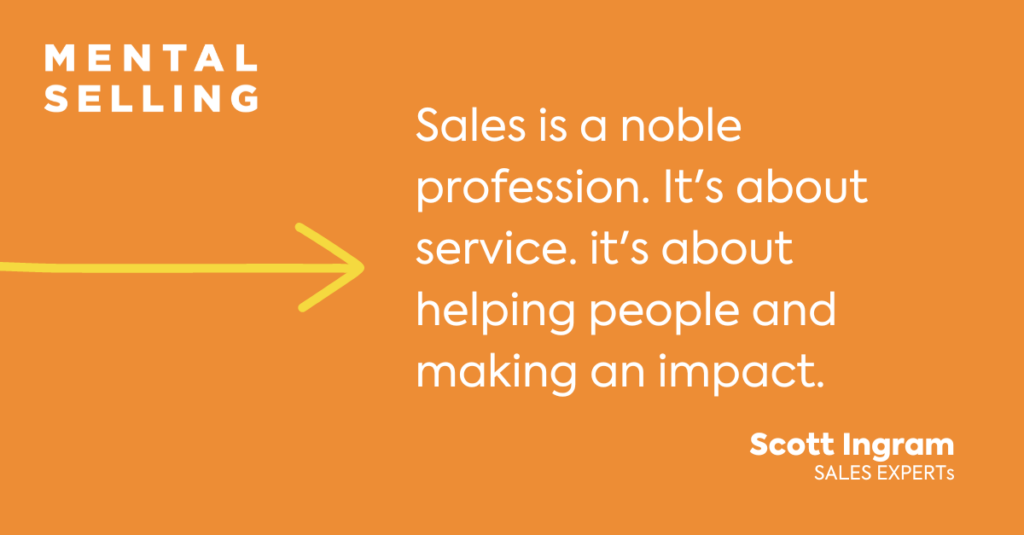Nurturing The Skills To Sell With Confidence

What does it take to break into the top echelon of sales — and stay there? There’s no magical formula or one-size-fits-all answer for how to do it. But there are some things we can all learn from the salespeople who consistently sell with confidence, perform at the top of their games and achieve more- for themselves, their companies and their customers.
Since the launch of his Sales Success Stories podcast around six years ago, sales expert Scott Ingram has interviewed more than 150 salespeople, all of them top 1% and number one performers in their organizations. As you can imagine, he’s learned quite a bit from those conversations about what fuels top-tier performance and what these star players have in common.
When I spoke to Scott for a recent episode of our Mental Selling podcast, he shared a number of qualities that help them achieve high performance, year in and year out. In fact, that episode has become our most listened-to episode (for good reason).
How Top Salespeople are Different from the Rest
Ingram was quick to highlight one specific factor that serves as a primary and potent force behind the success of all top salespeople:
“The first and most fundamental piece is around mindset and belief,” Ingram says.
As we’ve written about before, especially when it comes to selling, beliefs can either work for you or against you. Beliefs are the internal messages salespeople are constantly sending themselves about what’s possible, what they can achieve, what it means to sell and more. These messages can be incredibly powerful as they lurk below the surface, influencing the person’s ability to sell with confidence, their behaviors and actions.
We all have these internal conversations with ourselves. The difference for top sales performers, though, is that, rather than putting up boundaries, their beliefs are continually propelling them forward. In essence, top salespeople psych themselves up instead of psyching themselves out.
There are five categories of self-beliefs that impact selling success, and when these are all in alignment, salespeople are more energized and committed to the activities and behaviors that will make them high performers. It’s one of the reasons great salespeople stay positive and motivated regardless of economic downturns or a changing competitive landscape, as well as in the face of rejection and the other daily challenges and realities of sales.
While all of these beliefs are powerful, Ingram highlights three in particular:
- Belief in what you’re selling and the positive impact it has on the person you’re selling to
- Belief in your talents and abilities to be successful in sales
- Belief in your process and the activities you will commit to in order to achieve your goals
“When those all come together, they outperform by orders of magnitude,” Ingram told me.
He adds that, while the alignment of beliefs is the constant, the processes and the driving purpose are different for each person. “Top performers have a consistent way that they sell and tend to be students of the craft. They read and study and look at and try many different approaches and, over time, assemble the approach that fits them, their customer and what they’re selling.”

The best salespeople have a deep level of confidence in their approach. This is more than just a sales process; it’s a productivity process that guides how they structure their day, tackle their territory, manage opportunities and handle other necessary aspects of the role. And it’s largely based on how they are trained and coached- in other words, the sales culture they come from.
The other common denominator underlying all of their beliefs is purpose, “some type of why,” as Ingram puts it. They might be driven by a desire to take care of their family or overcome past adversity or simply be the best that they can be. Whatever that “why” is, they’ve tapped directly into it and it fuels their success, day in and day out.
Finding Your Selling Superpowers
As part of their strong self-belief, high-performing salespeople understand what their strengths are and how to leverage them. By figuring out their sales superpowers and then focusing their energy on getting the most from them, they’re able to perform at a consistently high level and sell with confidence. In fact, Scott and I discussed a belief that leaning into your innate strengths (instead of trying to be great at everything) can be more powerful than shoring up your weaknesses.
As his experience with hundreds of top salespeople shows, there is no single formula for a winning sales superpower. You can be an introvert or an extrovert, a doer or a talker, and be tremendously successful in sales. The key is figuring out what your own selling superpowers are.
The challenge with that is it’s sometimes difficult to see what we’re great at. It comes easily to us, so we don’t recognize it as a superpower. That’s why you need outside perspective and someone to help pull it out of you.
Customers can be a good source of perspective. Ingram suggests asking them questions like, What did you like about working with me? What didn’t you like? Why did you decide to buy, and why from me? You can even ask them what they think your sales superpower is.
The other essential resource is a great coach.
Coaching is About Helping People Sell With Confidence
Knowing how important belief is, it’s amazing how often companies miss the mark when it comes to onboarding, training and coaching in sales. By and large, there is still too much emphasis on managing the numbers — activities, number of opportunities, close percentages and the like — compared with coaching the individual and helping them perform to their full potential.
To be effective sales leaders and coaches for their teams, managers first need to understand where their people are in each of the five belief categories and then coach to that rather than spending so much time focused on the numbers. The whole point of coaching is to develop, grow and motivate people, to build their confidence and self-belief so that they can live up to what’s truly possible for them to achieve. But unlike reviewing opportunities or managing activities, this takes emotional intelligence on the part of the manager as well as alignment of their own beliefs and mindset.
The other key piece is coaching to the individual. Many managers fail at coaching because they try to make people do it the way they did it when they were individual contributors. But everyone has their own superpowers. What worked for the manager won’t necessarily work for their employees. Coaching should be collaborative and a dialogue, but in the end, it has to be owned by the salesperson, not the manager.
This is why the managers who are most successful at coaching salespeople to high performance are the ones who get their satisfaction from seeing other people develop the mindset to sell with confidence, consistently do their best and win. Just as top salespeople have a clear why and are laser focused on helping their clients, successful sales managers are focused on helping their team members get results. They’re motivated by the idea of helping their people find their superpowers and navigate their deals and get access to the resources they need to get their own great results.
In other words, if you’re still motivated by getting that personal win and closing that deal yourself, “you’re probably not ready for leadership,” Ingram says.
Coaching to Help Salespeople Win
In many organizations, there’s an underlying principle that either implies or overtly states that if more than a certain percentage of salespeople are at 100% or above on quota, then the quota must be too low. Particularly for those who fall below or are just above that threshold, this lens can be demoralizing and demotivating. It also ignores the work it took them to get where they are and how far they’ve come.
Put simply, “It feels to them like they’re underperforming or losing,” Ingram says. “That’s a horrible place to be.”
In most cases, this philosophy is counterproductive and can even contribute to a paralyzing fear of failure. A more productive approach is to focus on helping people win.
This starts with managers being transparent about how they’re arriving at the numbers and what the true expectation is. They need to help the salesperson understand when they should be worried — based on reality. It’s also about recognizing that 85% may be a huge accomplishment for someone based on where they had been, and that deserves celebrating. Again, it’s all about coaching to the individual.
This also reinforces the collaborative nature of coaching. As part of the process, the salesperson has to be involved in the goal-setting, and they have to own their goals. What’s more, they have to identify their why and then figure out what processes, behaviors and activities they need to consistently perform to reach that level.
Ingram suggests thinking of it as habit-setting instead of goal-setting. By making the decisions about what’s most important, the salesperson can then focus on executing on those priorities rather than being distracted and having to make lots of micro-decisions throughout the day.
The manager plays an important role in supporting the salesperson in this process and then holding them accountable to their plan. Instead of fixating on the number, the coaching conversation naturally will naturally shift to the tangible things they’ve identified that they need to do.
Keys to Breaking Into the Top 1% of Salespeople
There’s no big secret to breaking into top-tier sales performance. It takes work, and it starts simply with a decision. Ultimately, top sales performance comes down to you, your mindset, what you want to accomplish and the decision you make to do the work that it takes to get there.
It also takes a focus and commitment to doing right by your customers, above all else. Selling with integrity is about helping people make buying decisions that are in their best interests. Today’s customers are looking for a collaborator, a trusted advisor and someone who will be honest with them, treat them with integrity, understand what their problems are and then, assuming it’s the right fit, do the work to help them solve their issues. For these salespeople, the close is just another step in the process, and not the most important one. They know the most important step is making sure what they promised is delivered. When that happens, a whole host of new opportunities will open up and allow them to compound their impact with the client.
Ingram admits that when he started interviewing high-performing salespeople, he expected that he was going to encounter some big egos and people who are money motivated and focused on how much they can wring out of each sale. Instead, he says, he’s consistently seen that the best performers are the most selfless. They sell with confidence, no question, but even more so they care deeply about their clients and their clients’ outcomes, and by truly focusing their energies there, all of the other good things follow.
It’s a revelation that explodes a lot of the negative stereotypes about what selling is all about. At its core, selling is about service, helping people and making an impact. That’s why, when done right, sales truly is a noble profession.
You can also check out my contribution to Scott’s Daily Sales Tips podcast here.

Chief Marketing Officer
Related Blog Posts



